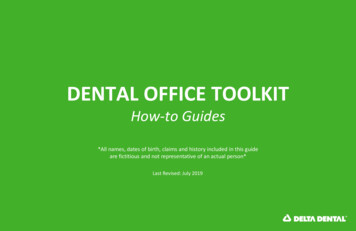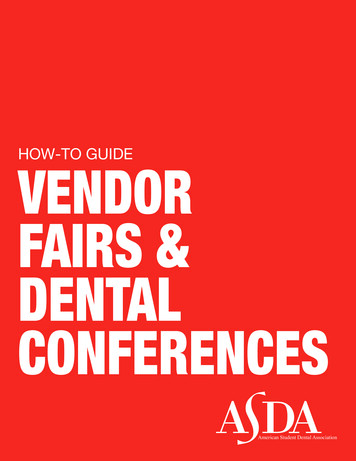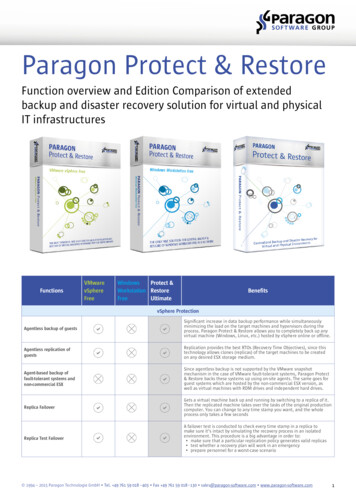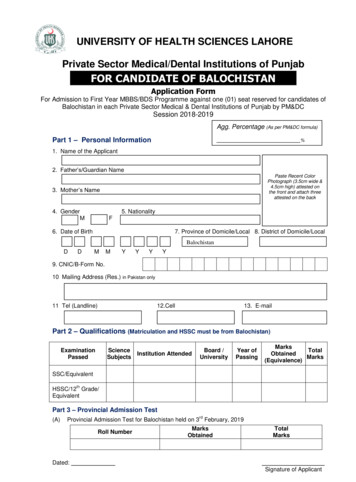
Transcription
SELLINGYOUR DENTALPRACTICEIf you fail to plan you should plan to fail!2 1 6 8 M a in S t r e e t , S u ite A Madison, MS 39110 www.paragon.us.com
If You Fail to Plan You Should Plan to Fail!TABLE OF CONTENTSWHY SHOULD I CONSIDER SELLING MY PRACTICE?.1HOW WILL I KNOW IT IS THE RIGHT TIME TO SELL? .4CAN DEMOGRAPHIC TRENDS AFFECT MY PRACTICE VALUE AND MARKETABILITY? .7WHAT ARE MY OPTIONS?.8IF I SELL MY PRACTICE WILL I HAVE TO GIVE UP CONTROL? .10IS THERE A COST TO WAITING A COUPLE OF YEARS BEFORE I SELL? .12WHAT IF I WERE TO BRING AN ASSOCIATE IN FOR A TRIAL PERIOD BEFORE I SELL? .13IS IT POSSIBLE TO SELL MY PRACTICE A PORTION AT A TIME? .14HOW LONG CAN I CONTINUE TO WORK AFTER I SELL MY PRACTICE? .15WHAT SHOULD MY EXPECTATIONS BE? .16WHAT IS MY PRACTICE REALLY WORTH?.17HOW WILL I KNOW I HAVE THE RIGHT PURCHASER?.18WHAT IF THE PATIENTS STOP COMING TO THE PRACTICE AFTER I RETIRE?.20IS THERE ANYTHING I CAN DO TO ENSURE THE PURCHASER’S SUCCESS?.21IS A TRANSITION PERIOD NECESSARY OR CAN I SELL AND SIMPLY WALK AWAY? .22HOW LONG WILL IT TAKE TO FIND A PURCHASER?.23WHAT SHOULD I SAY TO MY STAFF AND WHEN SHOULD I SAY IT? .24WHAT IF I OWN MY BUILDING? .25WHAT WILL IT COST ME TO SELL MY PRACTICE? .26PARAGON ARTICLES .28ARE SELLERS GETTING YOUNGER?. 28YOU JUST REALLY NEVER KNOW . 30THE DIMINISHING PRACTICE VALUE. 32PROCRASTINATORS BEWARE . 34GET A HEADSTART ON RETIREMENT . 38A BETTER RETIREMENT STRATEGY . 39I’M INTERESTED! HOW DO I GET STARTED? .41www.paragon.us.com 866.898.1867pagei
If You Fail to Plan You Should Plan to Fail!WHY SHOULD I CONSIDER SELLING MY PRACTICE?The first, and perhaps the most important, question you should be asking! But, in order tofully appreciate the answer, we must first discuss the only real reason that dentists selltheir practices CHANGE!Like death and taxes, change is just a fact of life. The process of change is an importantand natural part of the great cycle of life. And because dentists are people too, theyare not immune to the effects of change. As dentists grow older, their circumstancesand needs evolve. Eventually, their capabilities also change as emotional andbiological clocks begin winding down. This fact is aptly confirmed by ADA statistics,which show a stunning 42.8% decline in average practice gross collections for dentistsmoving from age 55 to 65.Dentists sell their practices in order to either facilitate or accommodate change. Thosewho are trying to facilitate change usually have some specific goal or objective inmind. For these doctors, the sale of their practice is a carefully planned event anintegral part of an overall plan toward economic freedom. On the other hand, thereare those who are attempting to sell their practices in order to accommodate or fixsome sort of unexpected change in their circumstances. They may be experiencing adivorce, an IRS judgment, a disability; or they may just be burned out. Whatever thereason, something drastic has usually occurred in their life, which has precipitated theneed to sell. Selling under such circumstances is an accommodation to the crisis of themoment. The crisis dictates the course of events and everything is more difficult.Practice sales thus occur in two broad categories: planned and unplanned.Planned transitions are preemptive. They anticipate the future and allow for therealization of specific goals and objectives. Planned transitions facilitate and direct thedesired course of events. And when properly structured and managed, they arefinancially and emotionally rewarding for the doctors, the staff, and the patients.Unplanned transitions arise out of crisis, and typically occur when there is a sudden orunexpected event. They are reactive rather than proactive. Unplanned transitions aredefensive in nature; a response to events or circumstances outside the status quo.Unplanned transitions are much more difficult and much less profitable. There areseveral important points to be made about this: First, change is a fact of life. But these subtle kinds of changes we are talkingabout are like periodontal disease you probably don't feel any pain as thedisease slowly progresses. And like any dental patient, unless you are madeaware of the consequences of failing to seek proper treatment, you probablywouldn't even know there is a problem. Second, the personal and practice changes in store for dentists 50 and older aremore acute and difficult than at any other time of life. That's why dental incomesbegin declining rather dramatically about this time. Even if everything in your lifewww.paragon.us.com 866.898.1867Page 1
If You Fail to Plan You Should Plan to Fail!seems to be going great now, (no, especially if everything is going great now)plan on dramatic changes over your next decade. Third, the opportunity to facilitate and direct the course of change alwaysprecedes the need to accommodate it. (Read that again, carefully.) In otherwords, just like a Perio patient, the opportunities to plan and direct the course ofyour life diminish over time. The longer you wait, the more likely you are to haveto accommodate. (Accommodation is reluctantly doing the right thing for all thewrong reasons). Fourth, facilitation is invariably more pleasant and profitable thanaccommodation. When a transition is facilitated properly, there is time to plan;time to seek the right candidate; and there is the opportunity to do the rightthing for all the right reasons. And finally, inaction is accommodation. Doing nothing about the changes thatare occurring in your life and your practice, or denying that they are evenhappening to you, allows those changes to dictate the course of your life. Justas untreated periodontal disease will inevitably lead to a loss of one's teeth, sothe process of change will gradually eat away at the life of your practice until ittoo is worthless.Now that you have a context for understanding why you should consider selling yourpractice, let’s be a little more specific.You should consider selling your practice if (or because) You wish to truly take control the process of change that is occurring. You have no immediate plans to quit practicing and need to maintain yourcurrent income from dentistry. You would like to convert the equity tied up in your dental practice into aninterest bearing cash investment, but you still want to maintain control over yourpractice and your future. You wish to be able to take quality time off from your practice without worryingabout the overhead. You wish to relieve yourself of the total burden of financial and emotionalresponsibilities associated with owning a practice. You really don't want your spouse and family to have to deal with the trauma ofselling your practice if you die or become disabled with no transition plan inplace.www.paragon.us.com 866.898.1867Page 2
If You Fail to Plan You Should Plan to Fail! You would like to lock in the value of your practice for estate planning purposes. You wish to convert your practice equity to an interest bearing investment.NOTE: a 10% compounded annually investment will double in value about every7 years. A 50 year old who sells a practice for 300,000 net today, willaccumulate over 1,300,000 for retirement at age 65 merely from practice equityalone. (More on this later) Less than 5% of all dentists are able to comfortably retire by age 65, and youwould like to be a part of those 5%. You look forward to the opportunity of working with a younger doctor who willbring a fresh infusion of energy and enthusiasm to your practice. You wish to broaden your interests and activities outside of dentistry such thatwhen your time as a dentist is over you have lots of life to live.Obviously, not all of the above factors will apply in every case, but if you peruse the listand discover that at least five of these statements apply to you, then you shouldseriously consider selling your practice through a well planned and properly structuredpractice transition process.www.paragon.us.com 866.898.1867Page 3
If You Fail to Plan You Should Plan to Fail!HOW WILL I KNOW IT IS THE RIGHT TIME TO SELL?For most dentists, the sale of their practice is something they think will happen far offinto the future when they are ready to quit and have plenty of money to retire. Forsome, the mere thought of selling is so repulsive that they proudly announce to theirstaff and patients that they will never retire. These doctors rationalize by thinking “nosense in worrying about something so far off into the future, right?” Why think about apractice sale now? After all, there are so many pressing things to worry about today;like training and motivating your staff, finding new patients, keeping current patients,fending off managed care, OSHA compliance, competition, taxes, computerization,and having enough left at the end of a day to go home and have a life. With all thosethings to worry about, who has time to think about transition?Patients with periodontal disease don't typically worry much about their 9mm pocketseither, until someone carefully explains what is going on and what will happen if theydo not seek treatment. The key to timing the sale of your practice is to first understandand acknowledge your present circumstances. At such time as a little probing alongthe gumline indicates that the disease is either present or progressing, then it is time tobegin the treatment.A key indicator for timing a practice sale is whether your practice gross income hasflattened out or started to decline. Since a major part of your practice's value dependson the amount of verifiable recent collections, a drop in revenue often means asignificant loss of practice value. From a purely financial standpoint, the right time to sellis before your practice stops growing.Perhaps the best indicator, however, is how motivated you feel inside. Would youdescribe yourself as more of an increaser or a decreaser? Increasers and decreasershave distinctively different needs, and should approach the transition process fromtotally different angles. If you can't wait to get back to the office on Monday morning; ifyou still enjoy managing and motivating your staff; or if you are constantly looking forways to grow your practice and see more patients, you are an increaser. On the otherhand, if you find your body in the practice while your mind is on the golf course; or ifyou have seriously entertained thoughts of cutting back your time at the practice dueto stress or fatigue; or if you are bored with practice and just marking time, you areprobably a decreaser. In addition, all of you will reach the point where you will begin tosense that your body is beginning to feel the effects of the constant stress andpunishment which dentistry hands out. If that's you, then you are also a decreaser (youjust haven't admitted it to yourself yet). This is true even if your practice is currentlyprospering and growing.If you are a decreaser, time is not on your side, and many thousands of dollars inpractice equity are at risk. Decreasers rarely become increasers, no matter how hardthey try to talk themselves into it. And the longer they wait the worse it gets. However,once the burdens of ownership are taken off their backs, we have seen manydecreasers really begin to enjoy dentistry again!www.paragon.us.com 866.898.1867Page 4
If You Fail to Plan You Should Plan to Fail!And the more they enjoy it, the more relaxed and productive they become. Perhaps itis because they can take a stress free vacation for the first time. Perhaps it is becausethey don't have to see every untimely weekend emergency patient. Perhaps it isbecause they can really focus only on the quality patients in their practice. Perhaps it isbecause they can now take more time pursuing their other interests besides dentistry.Probably it is a little bit of all of these reasons.A decreaser's primary motive in beginning a transition would likely be to enhance hisquality of life by making the most out of his remaining time in dentistry. His secondarymotive would be to lock in the value of his practice before it declines, and convert thatvalue into an interest-bearing asset. By so doing, the typical doctor can have four orfive times the amount of money (from the sale of his practice) he would have otherwisereceived by waiting until his actual retirement date to sell (more on this later).If you are an increaser, the primary reason to consider selling any portion of yourpractice would be to bring in another equally committed doctor to help manage thegrowth. Associates are not equally committed doctors. That's why they leave. That'swhy increasers who bring in associates eventually give up on their vision of how goodlife could be with another committed pair of hands in the practice. But it doesn't haveto be that way, and increasers simply need to learn how to structure a practiceopportunity for a young doctor that is worth committing to.If you decide to sell, you don't have to quit (we will address this in greater detail a littlelater). You just need to know how to structure the right kind of relationship with a new“partner”. Most dentists equate selling their practice with retirement, or a loss of controland status, and therefore often wait too long to begin the process. Across the country,we see more and more dentists selling their practices ten or more years before retiringfrom dentistry. If properly structured, these "pre-sale" arrangements can be an excellentmechanism for locking in your practice equity while maintaining your income untilretirement. As with any long-term relationship, bringing in a young equity partner willrequire more effort than simply walking away, but the quality of life and financialrewards are well worth it.We are not talking about a small amount of money here either. A 50 year old dentistwith a practice worth 300,000 can easily have over 1,000,000 more capital availableat retirement, just from the sale of his practice, than the dentist who waits until age 65 tosell. Moreover, the "pre-sale" doctor will have more control over his practice schedule;more time to do non-dental things; and an income comparable to, if not better thanthe practitioner who does not sell. So what's the catch? You must be willing to enter intoa Win / Win relationship with a younger doctor. That's it. Could you do that for anadditional 1,000,000 available for your retirement years?In summary, our experience over many years suggests that any doctor over age 50 whodoes not have a plan underway for the transition of his practice is jeopardizing one ofhis most valuable assets. Far too many doctors wait too long and receive much toowww.paragon.us.com 866.898.1867Page 5
If You Fail to Plan You Should Plan to Fail!little. This is a highly individual and complex issue worthy of very careful planning andconsideration involving you and your family. A thorough and realistic evaluation ofyour individual situation can be invaluable in assessing your options and making thebest decision.www.paragon.us.com 866.898.1867Page 6
If You Fail to Plan You Should Plan to Fail!CAN DEMOGRAPHIC TRENDS AFFECT MY PRACTICE VALUE ANDMARKETABILITY?Dental practices sell because established practitioners have what young dentists need;access to patients. These doctor-patient relationships are commonly referred to as"goodwill," and comprise about 75% to 80% of the value of a dental practice. Medicalpractices, on the other hand, rarely sell for more than the value of tangible assets. Inother words, there is no market value for medical practice goodwill. This is becauseyoung physicians can usually start their own practices from scratch, join a large grouppractice or associate with a hospital and enjoy an immediate patient (and income)flow.Over the past decade, the number of U.S. dental schools has decreased by tenpercent (60 down to 54), and the number of annual admissions to each school hasdeclined by almost thirty percent (105 down to 74). The most immediate impact of thissevere contraction in dental graduates has been to open up more opportunities forthese young doctors to start from scratch and survive. Just a few short years ago thatwould have been considered financial suicide. We are beginning to see many morestartups that are making it, although a practice purchase still remains by far the bestoption.As the time fully arrives again where young dental graduates can successfully start theirpractices from scratch, dental practice values will continue to decline. A slight declinein practice values actually began in 1990, with average values off 8-11% across thecountry since that time. We believe this trend is due primarily to the lower number ofdental school graduates looking to buy practices, and opting instead to start fromscratch.Demand may be off somewhat, but the supply side outlook is even more ominous.Between 1994 and the turn of the century, one in four (25%) of all practicing dentists willreach age 65. As more and more of this group put their practices on the market, therewill be an oversupply of opportunities courting fewer young buyers. Needless to say, thisdoes not bode well for maintaining current practice values in the years ahead. If youhave plans to sell in the next several years, it will be well worth the time and effort tobegin the planning process as early as possible toward the transition of your practice.This is one time where waiting too long to act will cost some doctors hundreds ofthousands in lost equity.www.paragon.us.com 866.898.1867Page 7
If You Fail to Plan You Should Plan to Fail!WHAT ARE MY OPTIONS?The first option is to do nothing and hope that your case will be different; that yourpractice value will not continue to decline; and that you will be one of the 5% of alldentists who make it all the way to age 65 fully prepared for retirement. Just remember,while you may get away with procrastination in the short run, transition will eventuallyhappen regardless. The only question is whether you want to take a proactive role infacilitating the positive things transition can bring about, or a reactive role where youstruggle to minimize the negative impact of the change.Whatever your decision, understand that the winds of momentous change are upon us,and there is now a significant cost associated with waiting too long to take action.If you opt to do nothing and still plan to retire in the next ten to fifteen years, don'tfactor in the current present value of your practice when planning your resources forretirement. It will be a costly mistake.To give you some idea of the financial cost associated with waiting too long, we ran ananalysis of two dentists of the same age with identical practices who took differenttransition paths.Dr. A sold his practice at age 55 and continued to work as the associatefor the purchaser for the next ten years. Dr. A retired at age 65. Dr. B soldhis practice and retired at age 65.Our analysis assumed that both Drs. A & B sold their practices for the exactsame 200,000. (It is actually highly unlikely that Dr. B would have sold hispractice 10 years after Dr. A for the exact same value. Dr. B's practicevalue realistically would have dropped dramatically given theaforementioned demographic trends.)Who made the right decision? You decide. Both doctors received theexact same take home income through the years from age 55 to 65, Dr. Aas an associate and Dr. B as an owner. Dr. A invested his practice saleproceeds and accumulated 518,748 for retirement by age 65. Dr. Breceived a 40,000 down payment at age 65 and a note representing 24,000 (principal and interest) per year for 10 years.Both of these doctors worked the same number of years in dentistry. Bothdid the same number of amalgams and crowns throughout their careers.Both took home the same incomes during their careers.Was Dr. A really that much smarter than Dr. B? Maybe he was!When the time arrives for you to seriously consider a transition, you should know thatthere are two basic ways to sell a practice. You can sell all of it, or you can sell part of it.www.paragon.us.com 866.898.1867Page 8
If You Fail to Plan You Should Plan to Fail!The variations on those two basic structures are numerous. For example, you could sellall of your practice to a young doctor and simply walk away. Or you might considerbecoming his associate, working when you want, on the patients you want, doing theother things you've always wanted to do but couldn't because you were tied to thepractice. This can work well if the practice qualifies, and if the agreement between thedoctors is carefully structured and equitable to both sides. Keep in mind that it ispossible to sell your practice and maintain your level of net income, while at the sametime diminishing your managerial responsibilities and time commitment. There areseveral ways this can be accomplished, depending on the circumstances. Some of youhave practices with so much untapped potential that we can bring in a qualified buyerand have both of you extremely productive within a very short period of time. In othercases, we may need to bring a young doctor that already has some production froman associateship or small practice. Either way, it is possible for you to see your patientsand earn the income you need without the hassles of management and the burdens ofownership.Selling 100% of a practice is typically easier and far less complicated than selling part ofone, and should be the preferred method of transition for all dentists who do notconsider themselves increasers. On the other hand, if you are clearly an increaser, youshould consider selling part of the practice now, and the rest later when you are closerto retirement. This method has proven best for middle-aged dentists who are stillexperiencing growth and who could use another set of committed hands in thepractice. Bringing in an equity partner is far preferable to the “revolving doorassociateships” we see so frequently. However, each method of transition offers certainadvantages and disadvantages. Careful consideration of both the opportunities andrisks associated with each approach should be made before entering into any bindinglegal agreements. These new relationships can be very rewarding if put togetherproperly. They can be devastating if they are not. This is not something that should beput together without sound professional advice from people who have directexperience in these types of agreements.Remember that while taking positive action may have its risks, taking no action at allhas even greater risks. If you do something positive, you have a good chance ofsuccess. If you do nothing, your practice equity will continue to depreciate. Just askyour physician friends how quickly it can go away.www.paragon.us.com 866.898.1867Page 9
If You Fail to Plan You Should Plan to Fail!IF I SELL MY PRACTICE WILL I HAVE TO GIVE UP CONTROL?Very good question! Dentists have a well-deserved reputation for being fiercelyindependent, and PARAGON recognizes that the thought of actually working in arelationship with another doctor can at first seem rather scary and unappealing. Butbefore you make a hasty decision, consider the following just what is it thatconstitutes "control" in a professional practice?Are you really in "control" of your practice or even your schedule for that matter? Howmany practice owners can take a two or three consecutive week vacation withoutgetting eaten alive by your practice obligations? Real control lies deep within your staffand patient relationships, and no one can come between you and your patients untilyou are ready for that to happen. A properly structured agreement between you andanother doctor can allow for those key relationships to remain with you for as long asyou wish. Such an agreement should carefully provide for all the proper financialincentives and legal rights and responsibilities of the parties. Be aware that there arethousands of subtle little things that must be considered to make these agreementswork. We have worked on this concept since 1988, and only recently have we felt likewe have all the bugs out.After just six short months in a pre-sale, one of our seller clients in this program called usup to say that he was enjoying dentistry more now than at any time in his life. He hadalso made more money each month since the sale than he ever had in solo practice.Maybe that helped. His only regret was that he waited until he was 60 years old beforehe did it!Make no mistake, however, the tremendous benefits of a planned transition do notcome without risks. Nor will they happen without a good deal of commitment and effortby all. Moreover, the structure of the transaction will need to be carefully put togetherto avoid unnecessary conflict and compromise.So why make the effort? Because now that you understand that you can maintain control over yourpractice (and your income) while at the same time allowing your practice equityto double or triple by the time you retire, you are left without any good reasonnot to do this. Because you want to have a better quality of life now and when you retire. Because you don't really want to die at the dental chair. Because you want the peace of mind that comes in knowing you are in practicebecause you truly love it, not because you have to make money to pay yourbills.Because you have a responsibility to your spouse and children to pass on theequity value tied up in your practice. www.paragon.us.com 866.898.1867Page 10
If You Fail to Plan You Should Plan to Fail! Because no right-thinking dentist would ever want his spouse and heirs to have todeal with the unbelievably difficult process of disposing of a practice postmortem. Because the best part of success is the opportunity to enjoy it. And finally, because being in solo practice isn't all that great, and havinganother committed colleague around might be a nice change of pace.Many of our clients transition in order to fund their retirement plans. If it is true that only5% of all dentists can afford to retire at age 65, then doesn't it make sense for more ofyou to convert your practice values into interest bearing and growing assets? Themiracle of compound interest works best over longer periods of time, making the costassociated with waiting each and every year extremely high. As previously mentioned,this can be a multi-million dollar decision.In summary, the vast majority of these properly structured transactions really do workout well for everyone. Many of our clients write to us describing their liberation from theduties and burdens of ownership and management. Perhaps one of our clients said itbest when he wrote:"I haven't always made the right business decisions with my practice, but Ican say without reservation that this was by far the best thing I ever did. Imust admit, however, that before we did this I was really concernedabout selling my practice outright and losing control of my primary sourceof income. The irony is that now I realize I really wasn't in control before.My practice ran me. Now, for the first time I can take extended vacationswithout worrying about the overhead. I can treat my patients and pick upmy check without having to deal with all the "other stuff" that used to bogme down. And I have maintained my income while cutting back myhours."Like this client, many doctors have come to know that only after they transition theirpractices are they truly in control of their futures. Only then are they able to work whenthey want, see the patients they want, and do only the kinds of procedures they enjoydoing. Only then can they assure their spouse and family that the value of what theyhave worked a lifetime for will really be available if something untimely should happento them. They eventually come to understand that their former sense of control overtheir lives was more of an illusion than reality.www.paragon.us.com 866.898.1867Page 11
If You Fail to Plan You Should Plan to Fail!IS THERE A COST TO WAITING A COUPLE OF YEARS BEFORE
Practice sales thus occur in two broad categories: planned and unplanned. Planned transitions are preemptive. They anticipate the future and allow for the realization of specific goals and objectives. Planned transitions facilitate and direct the desired course of events. And when properly structured and managed, they are











